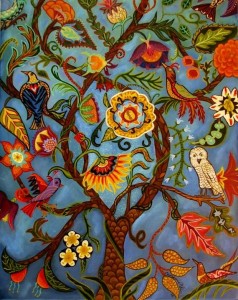Dear Integral Meditators,
Where is the mind?
Where is your mind? Before you read on, just spend a few moments checking where you yourself experience your mind right now; in the head? Throughout the whole body?
The contemporary person tends to think of the mind as being located and associated with the brain (it is the physiological organ of thought right?) but this has not always been the case. For example I have been practising Qi-gong for many years, and within Qi gong and Taoist philosophy the mind energy is said to be located in the heart, with our spirit energy located in the head and our vital energy down in the solar plexus.
The thoughts in your heart
If you think about your mind as being in your heart right now, and ask yourself the question “What are the thoughts arising from my heart-mind” I think you will see that there is definitely a mental language that our heart is speaking to us at all times, a language that is different, perhaps deeper and more direct than our ‘head-speak’.
Awareness of the heart and chest
The other thing about the thoughts in our heart is that they speak very directly of and from the way we really feel. With our ‘head language’ we can deny, repress and rationalize away the way we are feeling, but with the language of our heart the feelings are always right there and if we listen we cannot turn away from them.
Courage as the root of all mental virtues?
When we are not in touch with the way we feel, then it is possible for these ‘hidden’ feelings to twist and falsify our thoughts. It takes courage to listen to the thoughts within our heart, because it often speaks from a space of emotions that we are uncomfortable, wary or scared of. But if we are to think truly and clearly (with both our heart and head) then we need to be deeply congruent with the way we are feeling at all times. Because this takes courage, or ‘Lion-heartedness’ it is possible to think of courage as the root of all virtues. As Winston Churchill famously said “Courage is rightly esteemed the first of human qualities… because it is the quality which guarantees all others.”
Listening to the voice of your heart-mind
If you would like a mindfulness exercise to explore this over the next few days (weeks/months/years, it is a deep practice!) then simply sit down and tune into the voice and energy of your heart-mind, listen to what it is saying to you, to the feelings that it is speaking from. Listen to the unified voice of your mind and feelings together. It is not always and unconditionally ‘right’ but it is almost always speaking from a place of truth.
Related article: If you feel properly, you will think clearly
© Toby Ouvry 2014, you are welcome to use or share this article, but please cite Toby as the source and include reference to his website www.tobyouvry.com
 Introducing: Deep Delta
Introducing: Deep Delta
A 40-minute journey that has you feeling like you are floating in a beautiful, calm ocean, moving deeper and deeper into serenity and relaxation.
Special Introductory Rate (20% Off) thru February 8th Only. Learn More.
“This deeply immersive track has been developed to assist in promoting delta waves in the brain. By increasing this brainwave activity, the listener moves into the ideal place to experience a profoundly relaxing state and a myriad of positive benefits:
- Release of anti-aging hormones
- Extreme bliss
- Advanced healing of body and mind
- Human Growth Hormone (HGH) release
- Very deep level of mind / body relaxation
- Connection with subconscious mind
- Boosted immune system
Some of my tracks have been tested with hypnosis clients using EEG analysis equipment, with the help of Dr. David Newman, who observed clients getting into thedelta wave state as early as 5 minutes into listening; he hadn’t seen anything work so quickly before.”
Life-Coaching * Meditation Technology










